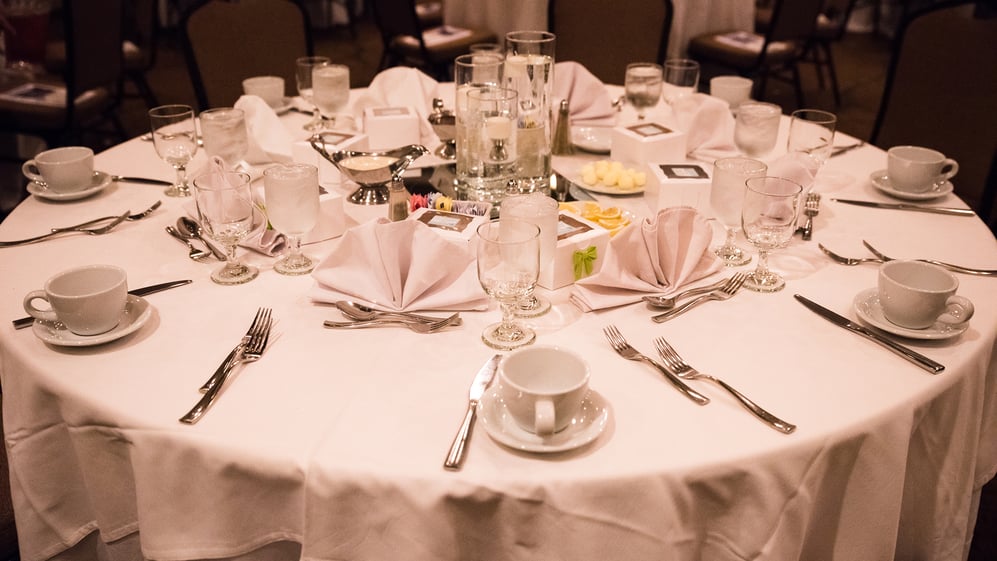In polite society, we are raised with table manners: don’t hum or sing, keep your elbows off the table, place your napkin in your lap, don’t burp aloud (although this is allowed in some cultures as a compliment to the chef), don’t reach over another person’s plate. There are rules for seating at a dinner party as well, and Jesus makes reference to these in this month’s parables of the wedding feast and the great banquet.
Jesus was often invited to meals, and His hosts had a variety of motives for doing so. Some asked Jesus to table with innocent intentions. Others, as is likely the case with the Pharisees, hosted Jesus to find errors in His teaching, catch Him in heresy, or in some other way discredit our Lord.
Like other parables, Jesus uses this allegory to present more than one lesson. On the one hand, Christ admonishes those present and the reader toward genuine humility and mercy. Don’t assume. Allow the host to assign places of honor. Regard others as greater than yourself. If you host a meal or other gathering at your home, invite those who cannot repay. While such behavior is endearing and praiseworthy, Jesus is pointing to something deeper.
The Parable of the Wedding Feast (Luke 14:7–11)
Now He told a parable to those who were invited, when He noticed how they chose the places of honor, saying to them, “When you are invited by someone to a wedding feast, do not sit down in a place of honor, lest someone more distinguished than you be invited by him, and he who invited you both will come and say to you, ‘Give your place to this person,’ and then you will begin with shame to take the lowest place. But when you are invited, go and sit in the lowest place, so that when your host comes he may say to you, ‘Friend, move up higher.’ Then you will be honored in the presence of all who sit at table with you. For everyone who exalts himself will be humbled, and he who humbles himself will be exalted.”
The Parable of the Great Banquet (Luke 14:12–14)
He said also to the man who had invited Him, “When you give a dinner or a banquet, do not invite your friends or your brothers or your relatives or rich neighbors, lest they also invite you in return and you be repaid. But when you give a feast, invite the poor, the crippled, the lame, the blind, and you will be blessed, because they cannot repay you. For you will be repaid at the resurrection of the just.”
Law
Jesus offers a contrast to our natural, sinful tendency to extend kindness to those we know and love, who can reciprocate our affections and benevolence. Anyone can do that. Even unbelievers! In this way, Jesus condemns the Pharisees and lawyers present. Instead, Jesus charges,
“When you give a dinner or a banquet, do not invite your friends or your brothers or your relatives or rich neighbors, lest they also invite you in return and you be repaid. But when you give a feast, invite the poor, the crippled, the lame, the blind, and you will be blessed, because they cannot repay you. For you will be repaid at the resurrection of the just.”
Secondly, Jesus stresses the importance of considering the good of others. In love, we act in humility. Christians often misunderstand this point. Jesus doesn’t expect us to think of ourselves as less than our neighbor. Remember, through faith in Christ, God calls us His children. He regards us with the righteousness of His Son. We live in forgiveness and the promise of eternal life. Instead, we choose to act for the benefit of others.
Gospel
Read the parable again, looking for Jesus and His message of salvation. At a banquet, it’s customary for the host to sit at the head of the table. Where does the guest of honor sit? At the host’s right hand. What do we say in the Apostles’ Creed? Jesus ascended into heaven and sits …? As always, Jesus is pointing to Himself. Neither table etiquette nor kindness to others opens the gates of heaven. Only Jesus! Jesus surrenders the place of honor in divine humility, taking our sins upon Himself. In doing so, Christ rescues us from the seat of ultimate dishonor—death and hell. He raises us to honor—forgiveness and life eternal. It’s the divine exchange.
Jesus calls us to invite those who cannot repay. Again, Jesus illustrates God’s grace. In sin we are poor, crippled, lame, and blind, wholly unable to save ourselves or ever repay the costly sacrifice at Calvary’s cross. Jesus humbles Himself in obedience to the Father. Having accomplished His goal of a sinless life, and by His innocent and victorious resurrection, Jesus is now exalted, sitting at the right hand of God in heaven.
Teaching Ideas
Table etiquette is largely an under-emphasized aspect of modern life. What better opportunity to teach little ones both etiquette and the Gospel? Arrange a dining space in the teacher area. Research proper setting arrangement and seating. While teaching the same, draw in the Gospel elements. God sits at the head. Jesus is at the right hand. In mercy, Jesus moves down to bring us up! To further illustrate, have students take seats, assuming the roles of those present with Jesus.
Crafting wedding invitations is a hands-on strategy that would attract students of all ages. Bring in a few samples. Help students craft their own. Change the normal information inside to help students connect the Gospel to themselves. Instead of the parents extending the invitation, write in God. Replace the friend or family member with the student’s name. God invites us through the work of the Holy Spirit.
Scripture: ESV®.
Song Suggestions
From: All God’s People Sing!
- Behold, What Manner of Love, 71
- Father Welcomes, 95
- I’m So Glad, Jesus Lifted Me, 134
- Lord, Whose Love in Humble Service, 172
- Today Your Mercy Calls Us, 249
Looking for suggestions on teaching other parables?






.jpg?width=50&height=50&name=IMG_20220621_160541_456%20(1).jpg)







